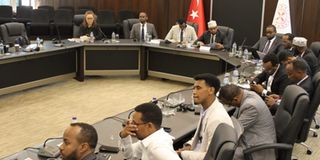Bridging the Future: A study tour of Turkey and the promise of public-private partnerships in Somalia

Somalia's delegation, led by Finance Deputy Minister Abdikadir Hange during a recent engagement tour of Turkey.
As the sun set over the vibrant cityscape of Istanbul, I found myself reflecting on the profound insights and experiences gathered during our study tour in Turkey.
Representing a delegation of government officials from various ministries and private sector leaders from Somalia, our mission was clear: to explore and understand the intricacies of Public-Private Partnerships (PPP) and envision how these partnerships could be harnessed to fuel Somalia’s ambitious plan, the National Transformation Plan (NTP) 2025-2029.
Our journey through Turkey's impressive infrastructure projects—Northern Marmara Highway, 3rd Bosphorus Bridge, Ankara Bilkent City Hospital, Ankara Airport, and Eurasia Tunnel—showcased the transformative power of PPPs, where the collaborative efforts between the public and private sectors have resulted in an infrastructure that not only meets but exceeds global standards.
We began our tour with a warm reception by Mr İlhan Hatipoğlu, Deputy Minister of Treasury and Finance, at the Ministry of Treasury and Finance in Ankara, our delegation, led by Mr Abdiqafar Elmi Hange, Deputy Minister of Finance, was inspired by Turkey's success. Mr Abdiqafar emphasised the need for Somalia to embrace PPPs as part of its post-HIPC strategy for national transformation.
The opening sessions detailed Turkey's PPP legal framework and regulatory environment, highlighting sector-specific models like Build-Operate-Transfer (BOT) for transport, Build-Own (BO) for energy, and Build-Lease-Transfer (BLT) for health. These models have driven infrastructure development and improved public services.
Logistics infrastructure: The Promise of PPPs in Somalia’s NTP
Our discussions in Turkey underscored the importance of modern transport networks for economic growth. A dedicated lab under the NTP for logistics infrastructure can revolutionise Somalia's sector. Modern airports, ports, highways, and bridges will boost trade, tourism, and inclusivity. New fishing ports will enhance the fishing industry, create jobs, and improve food security. Regional roads will connect all regions, increasing domestic trade and boosting trade volumes with neighbouring countries, crucial for Somalia's East African Community membership. These projects will attract private investments, driving job creation and economic growth, turning ambitious visions into achievable milestones.
Energy Sector: Powering Economic Transformation
PPPs can revolutionise Somalia's energy sector, essential for economic development. The NTP prioritises energy infrastructure, focusing on affordable, sustainable energy for industrial growth and improved living standards. Investments in renewable energy projects, like solar and wind farms, modernising power plants and expanding the grid to rural areas will meet current and future demands. The PPP model, with shared risks and rewards, makes large-scale energy projects viable and attractive to private investors, ensuring economic resilience and sustainability.
Healthcare: Transforming Somalia’s health infrastructure
During our tour, one of the standout visits was to the Ankara Bilkent City Hospital. This massive healthcare facility, with a bed capacity of 4,050 and indoor space of 1.3 million square meters, is the largest hospital in the world constructed as one piece. It stands as a model for how PPPs can deliver state-of-the-art healthcare infrastructure. In contrast, Somalia’s healthcare infrastructure is in dire need of heavy investments.
Many of our citizens are forced to travel abroad for medical treatment, incurring significant costs. By developing similar healthcare facilities through PPPs, we can drastically reduce these costs, provide quality healthcare at home, and improve the overall health outcomes of our population.
Tourism Facilities: Unlocking economic potential
Another area ripe for PPPs is tourism. With its rich cultural heritage, stunning landscapes, and historical significance, Somalia has immense potential to become a sought-after tourist destination. By developing world-class tourism facilities through PPPs, we can not only attract more visitors but also create numerous job opportunities, boost local economies, and promote cultural exchange.
Consider the former government-owned hotels like Juba and Uruba in Mogadishu. Revitalising these hotels and transforming key government-owned installations into hotels, apartments, malls, and offices can generate significant revenue, create jobs, and contribute to security. This not only revives our tourism sector but also ensures that these historical landmarks are preserved and utilised effectively.
In a nutshell, PPP projects such as building hospitals, tourism infrastructure, and logistics networks, will create jobs, employing thousands of young Somalis. This boosts the economy and enhances security, as employed youth are less likely to engage in destabilising activities
With insights from Turkey and the leadership of President Hassan Sheikh and Prime Minister Hamza Abdi, Somalia is set to harness PPPs, advancing our National Transformation Plan for a prosperous future.
Mr Abdirizak Ibrahim, is the Deputy permanent secretary in the Office of the Prime Minister, Federal Government of Somalia [email protected]



